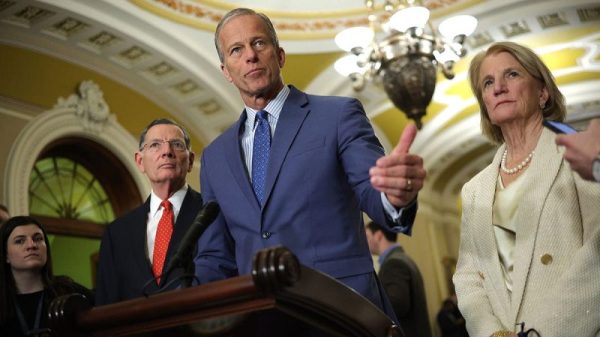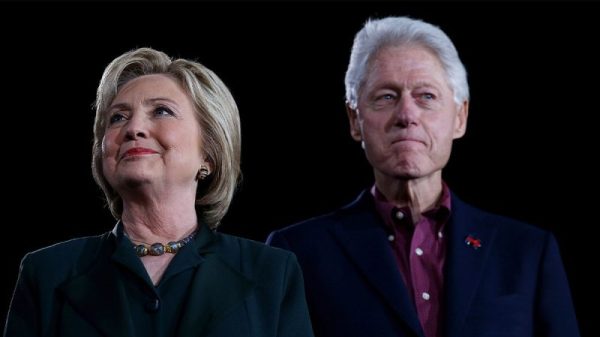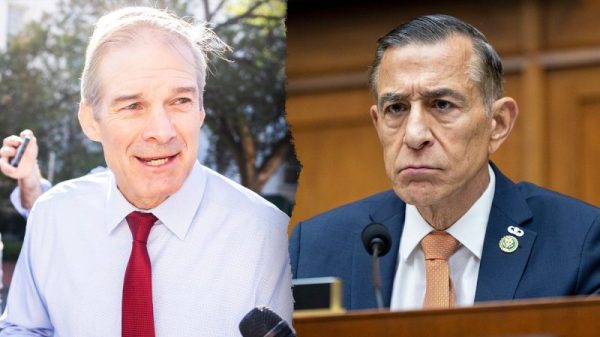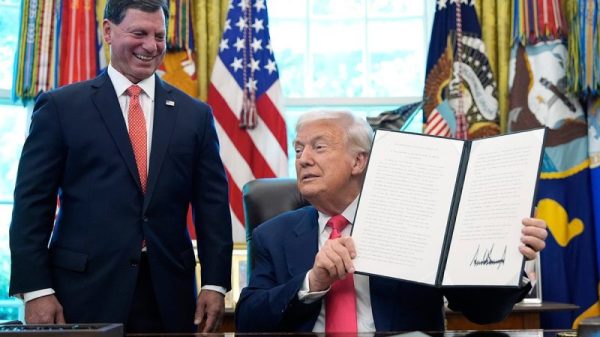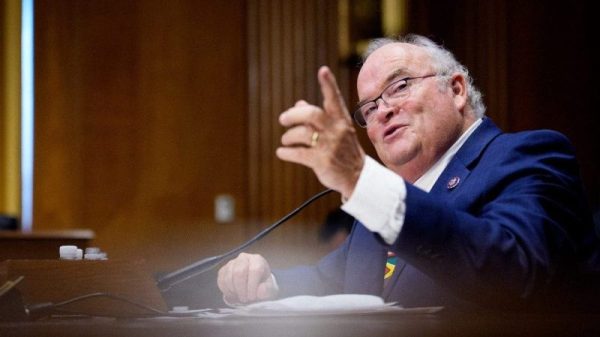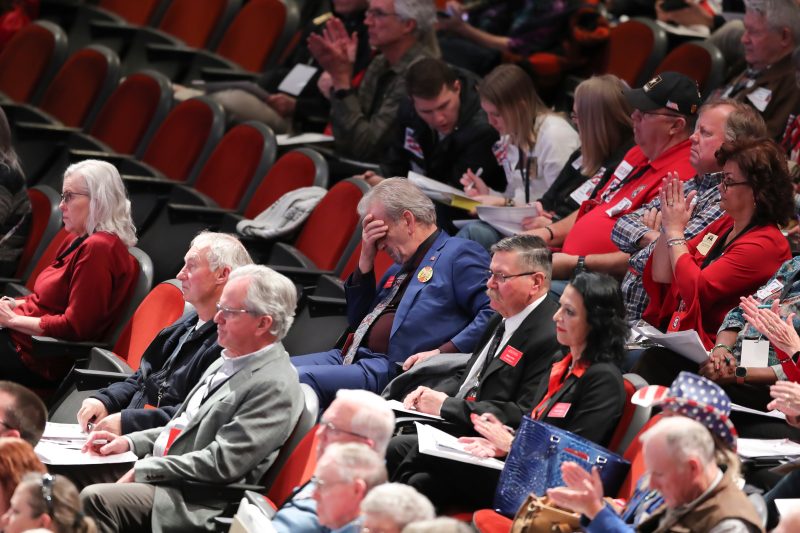In Arizona, the state GOP chairman has been begging the Republican National Committee for a financial bailout. Michigan party officials have gotten into physical fights as their finances have dipped into the red. And in Georgia, the state party is in a standoff with the Republican governor and saddled with legal fees for alternate electors put forward in 2020.
In each of these 2024 battlegrounds, election denial and grassroots fervor for former president Donald Trump have rocked the Republican apparatus. Now, the state parties are plagued by infighting, struggling to raise money and sometimes to cover legal costs stemming from Trump’s efforts to overturn his 2020 defeat — threatening to hamper GOP organizing capabilities in next year’s presidential election.
“There has been an emphasis on ideological cleansing instead of electioneering,” said John Watson, the Georgia GOP chairman from 2017 to 2019. “If those new entrants to the party want to argue the earth is flat and the election is stolen, those are counterproductive to winning elections.”
State parties are typically critical in election years for mobilizing volunteers and running get-out-the-vote efforts, and they can collect larger checks or buy cheaper airtime than other groups. Those functions are now in doubt as the fissures fuel finger-pointing and competition for donor dollars. Even as more experienced leaders have taken the reins in some cases, they are struggling to undo some of the damage from MAGA-aligned predecessors and deal with continued pressure from the movement.
The transformation in these key states is the result of a coordinated movement, sometimes called the “Precinct Strategy.” Former Trump adviser Stephen K. Bannon and other MAGA influencers have promoted the effort in the past three years to slot election deniers into local party positions and demand new leadership. In local and state parties across the country, operatives and local officials say the makeup of state party leadership has changed.
“It’s like in any revolution or any civil war,” Bannon said in a recent interview. “You get victories. But the moneyed class, they’re not going to sit there and pat you on the head and say, this is terrific.”
Trump and his team have become deeply involved with state parties, elevating candidates for positions who back him, courting members at his Mar-a-Lago resort home and attacking officials in states who oppose him. His campaign could be the one to have to make up lost ground from shortfalls in local fundraising and field operations. Trump campaign spokesman Steven Cheung said, “When President Trump is the nominee, everyone will be aligned.”
In each of these states, cultivating center-right voters is key for a Republican to win the presidency. But the activists who overwhelmingly embrace Trump’s false election claims, demand fealty to him and want to purge the party of Trump critics such as Georgia Gov. Brian Kemp, have largely taken over, according to operatives in multiple states.
As one senior Republican who spoke on the condition of anonymity to be candid put it, for anyone seen as out of step with the MAGA movement, “they will not work with you; you’re the devil.”
In January, Jeff DeWit was elected Arizona state GOP chairman as a consensus choice who could bridge the party’s internal divisions between pro-Trump, election-denying activists and more-traditional conservatives, given his record of winning a statewide race in 2014 for treasurer and his early support of Trump’s first presidential run. He inherited a party in disarray from the previous chair, Kelli Ward, a MAGA firebrand who led efforts to overturn Trump’s 2020 loss in the state and has since decamped to a boat in the Caribbean.
DeWit has repeatedly asked national Republican groups for financial support that largely has not come. His appeals to the RNC began in February and have extended through mid-September, including to national and regional staffers and directly to RNC chairwoman Ronna McDaniel, according to people familiar with the discussions, who like others spoke on the condition of anonymity to disclose private conversations.
“He would just ask people, ‘When does money start cycling in?’” said one GOP operative familiar with some of DeWit’s requests.
McDaniel and RNC staff met privately with DeWit, at his request, at the RNC’s meeting in Oklahoma City in late April. According to a person familiar with the conversation, DeWit told her, “‘We desperately need to keep the lights on.’” DeWit said they were in debt because of legal bills related to putting forward alternate electors falsely claiming Trump won the 2020 election.
Multiple state parties have asked McDaniel and the RNC for money for 2020-related legal bills, according to people familiar with the matter.
McDaniel encouraged him to draft a plan detailing needs and goals, and said the party was not paying legal bills. During other conversations, RNC officials have referred DeWit to a program intended to incentivize state parties to build out their own finance, data and political operations, people familiar with the discussions said.
But the state party’s needs far exceeded that program’s estimated yield. When DeWit took over, the state party had about $1 million, which mostly reflected the sale of its longtime headquarters and fundraising from the 2022 midterm cycle. The party bought new headquarters this summer; its latest financial disclosures showed about $55,000 in its federal account and $34,000 of debt owed to various vendors.
The state account reported about $214,000, mostly from a single out-of-state PAC called “Patriot Freedom.” The PAC’s treasurer, Patrick Krason, said the $200,000 contribution was meant to help the Arizona GOP oppose ballot measures on ranked-choice voting.
“The effectiveness of their spending informs our future donation decisions,” the PAC said in a statement. Its funders include Caryn Borland, a California donor whose planned fundraiser for then-Vice President Mike Pence was canceled in 2020 after QAnon memes were found on her and her husband’s social media pages. Krason said the Borlands “are not supporters of the QAnon Community.”
DeWit downplayed the minimal cash flow in the state party’s accounts, noting that balances are typically lower during the year ahead of presidential elections. “The AZGOP has made great strides this year in restoring trust in our base that we are working to build the infrastructure needed to win in general elections again,” he said in a written statement.
In another source of strain, the Arizona GOP was at odds with the House Republican campaign arm over an unusual legal dispute between state party treasurer Elijah Norton and Rep. David Schweikert (R-Ariz.), who represents a battleground district. Norton sued Schweikert for defamation related to political attacks during his unsuccessful primary challenge last year.
During a tense mid-March meeting inside the state party’s headquarters, Norton presented a stack of mailers, social media posts and other records that he viewed as offensive and sought an apology from Schweikert, according to people familiar with the meeting. In response, Schweikert described the attacks as the nature of political campaigns and left. The litigation is in the process of being settled.
Meanwhile, local party staff have been deluged all year with phone calls, texts and emails from MAGA-aligned activists who want to punish or purge Republicans they deem as insufficiently loyal, according to people familiar with the party’s operations.
This summer, for example, a county party stripped Karrin Taylor Robson, who lost the 2022 gubernatorial primary to Kari Lake, and her brother, a former county supervisor, of their voting privileges as GOP precinct committee members. Maricopa County GOP chair Craig Berland said the punishment reflected “our commitment to principled Republican unity as the fundamental basis for winning elections.”
In early September, DeWit thwarted the county party’s efforts to withdraw from the 2024 state government-run presidential preference election and hold its own one-day, in-person vote with paper ballots that would have been counted by hand. The party did not have the money, manpower or infrastructure to run an election for 1.4 million eligible voters, he said. He received attacks from Trump supporters, who were pushing for such a move.
In Michigan, infighting within the state GOP has twice broken out into physical altercations. The fights played out as Republicans there have disputed who controls some county parties, with competing factions claiming to be in charge.
The state chair, Kristina Karamo, was elected in February in a MAGA groundswell, besting Trump’s own pick of failed attorney general candidate Matt DePerno. Both he and Karamo, who ran unsuccessfully for secretary of state, came to prominence for baselessly claiming fraud in the 2020 election.
“What you have to understand, there was a disruption in the system,” Karamo said in an interview at a Trump campaign event in Michigan in September. “I’m not your milquetoast Republican. So people who want a stuffy, disconnected, elitist party, I’m not their girl, and I’m not going to ask them for anything.”
But many Michigan Republicans have already lost patience with Karamo’s leadership over concerns about the party’s finances. Some of her past supporters are already calling for her ouster.
Warren Carpenter, who supported Karamo’s run for chairwoman at the February convention, recently stepped down as a district chairman and called for Karamo’s removal. Jon Smith, who was also a district chairman until recently, said he considers Karamo a friend, but the party needs to look into removing her.
The pressure led Karamo to address party members in an emergency meeting in late October. At the meeting, party officials revealed they had a deficit of $375,000 as of April, with $265,000 in the bank and $640,000 in debt. They declined to describe the condition of the party’s current finances, but internal records that have been made public show the party had about $35,000 spread across seven bank accounts as of August.
Karamo blamed past party leaders who she accused of trying to sabotage her, making her task of raising money and recruiting volunteers harder, and acknowledged her insularity.
“One of the big problems in our party is a constant betrayal by a lot of our Republican elected officials, so that many people quit the party,” she told the group, according to a recording of the meeting. “I get stabbed in the back by a lot of opportunists.”
Karamo said she had not taken a paycheck since July. Her chief of staff, Joel Studebaker, said he had turned down his pay since May. “We operate on principle before money because we answer to a higher calling,” Studebaker said at the meeting.
Budget committee member Jessica Barefield recently resigned, writing in a letter obtained by The Washington Post that officials had discussed selling the party’s headquarters because of “imminent default” on a line of credit. She and others have questioned the party’s legal authority to sell the building because it is owned by a trust, not the party.
The party has also been roiled in recent weeks by the leak of a spreadsheet that ranked the attendees of a Republican conference on a four-point scale that ranged from “patriot who might volunteer” to “Me First or RINO or Concerning Affiliations.” Stalwart party members blanched at being labeled RINOs, or Republicans in name only.
Studebaker said at the October meeting that he had created the spreadsheet in part to identify volunteers but had not given anyone rankings. He did not identify who made the rankings but said he and Karamo were not aware of it at the time.
“I think amateur hour is in full swing,” Smith said of the list.
At a bucolic wedding barn in rural Gillsville, halfway between Atlanta and the South Carolina border, a few hundred Republicans came dressed up for a barbecue dinner and an auction to raise money for legal fees of some of the people who served as alternate electors falsely claiming Trump won the 2020 election here.
The state party is stuck paying legal bills for the alternate electors after the executive committee voted in January to indemnify them, and followed up with another similar vote after former state GOP chair David Shafer’s successor, Josh McKoon, became chair in April, according to a person with knowledge of the state GOP’s internal deliberations. Shafer was charged by Fulton County District Attorney Fani Willis, in a case that centers on efforts to overturn Trump’s 2020 defeat.
At the fundraiser, second vice chair David Cross said the state party needed help and had been abandoned by Kemp. “I know I’m going to get in trouble for this, but our general has not lifted a finger to help the Georgia GOP,” Cross said to cheers.
Kemp fell out with the state party over the alternate-elector plan, the party’s claims of a stolen election and Shafer’s support for Trump even as he slashed Kemp and other Georgia Republicans. Kemp’s allies in the state legislature created a new type of political committee with no contribution limits, effectively empowering Kemp to bypass the official state party in fundraising and election spending.
A Kemp adviser, speaking on the condition of anonymity to be candid, said the move was necessary because the formal party leadership had been taken over by extremists, and that other candidates in the state were now supported by Kemp’s group. The adviser said his political operation had little contact with the state party in recent years.
Though Shafer handpicked McKoon to succeed him, the new chair has sought to reset relations with the governor. In an interview, McKoon effusively praised Kemp’s leadership and said he welcomed Kemp’s group and others besides the party to counteract the well-funded outside groups on the Democratic side.
“Yes, some grassroots activists are put out with this Republican or that Republican. What I say to those folks when I talk to them is, you’ve got a decision to make. Do you dislike a Georgia Republican more than you want to win the White House?” he said. “We’ve got to get away from this idea it’s some kind of us-them mentality.”
The party’s disclosures show that it raised $65 million in the four-year period ending in June, almost three times more than the previous four-year period, and Shafer left the party with $1 million on hand. But now the party has expensive legal bills. Its most recent campaign finance report disclosed more than $500,000 in legal expenses in the first half of 2023.
Watson, along with another prominent Republican, said donors were less interested now in giving to the state party because of perceptions that Trump’s fraud claims suppressed Republican turnout in the 2021 U.S. Senate runoffs. The party is appealing directly to members with special fundraisers like the one in Gillsville.
The event collected some $20,000, routed through the local county GOP, with auction items including a Ruger Mini-14, a stay at a Florida vacation home, and an autographed photograph of Alex Rodriguez with Trump.
“The state party in this situation is not seen as a viable partner to win elections necessary in November,” Watson said. “He’s got a severe uphill climb to bring the party back to relevancy.”

